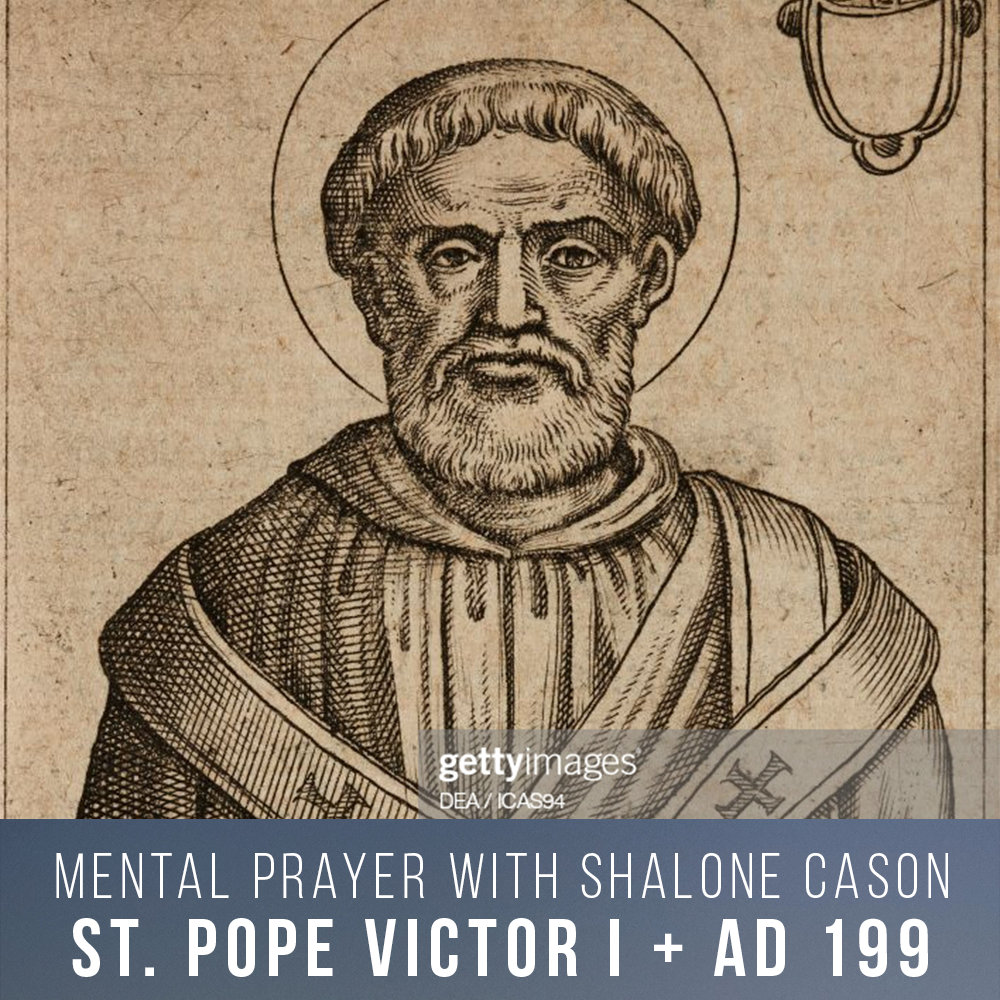Pope Victor I (died 199) was the bishop of Rome in the late second century (189–199 A.D.). He was of Berber origin. Meaning, he was the first black pope. He reigned for about 12 years and he excommunicated churches for celebrating Easter based on the Jewish date of Passover and not on a Sunday. Eventually he reversed his decision, and in the end, all Christians began celebrating Easter on the same Sunday. Today we are discussing the years 189 to 199 AD, when Victor became pope and the Easter controversy happened.
Don’t forget to leave a review on Apple podcasts. Everywhere else, please like, share, and subscribe.
Please Subscribe or Donate to Help Keep This Site Free!
Transcript
Biography of Pope Victor I
Alright, let’s begin by talking about Pope Victor and the Easter controversy. Pope Victor I (died 199) was the bishop of Rome in the late second century (189–199 A.D.). He was of Berber origin. But hold up...let’s talk about the Berbers a bit. Because I bet you didn’t know that Pope Victor was the first African pope. And if you follow this podcast, you know I love black Catholic history. So let’s discuss the Berbers. Berbers are an ethnic group of North Africa and West Africa, specifically Morocco, Algeria, Tunisia, Libya, Mauritania, northern Mali, northern Niger and the Canary Islands. In historical times, the Berbers expanded south into the Sahara (displacing earlier populations such as the Azer and Bafour). Much of Berber culture is still celebrated among the cultural elite in Morocco and Algeria.
The areas of North Africa that have retained the Berber language and traditions best have been, in general, Morocco and the Hautes Plaines of Algeria (Kabylie, Aurès etc.), most of which in Roman and Ottoman times had remained largely independent. Numidia (202 – 46 BC) was an ancient Berber kingdom in modern Algeria and part of Tunisia. It later alternated between being a Roman province and being a Roman client state. This is most likely the area where Pope Victor lived before he became pope. Long story short, Pope Victor was black and I think that’s a cool fact that most people don’t know. Moving on...
The dates of his tenure are uncertain, but one source states he became pope in 189 and gives the year of his death as 199. He was the first bishop of Rome born in the Roman Province of Africa—probably in Leptis Magna (or Tripolitania). He was later considered a saint. His feast day was celebrated on 28 July as "St Victor I, Pope and Martyr".
The primary sources vary over the dates assigned to Victor's episcopate, but indicate it included the last decade of the second century. Concerning the duration of his episcopate, Eusebius, in his History, does not state directly the duration of his episcopate, but the Armenian version of Eusebius' Chronicle gives it as 12 years. The Liberian Catalogue gives his episcopate a length of nine years two months and ten days, while the Liber Pontificalis states it was ten years and the same number of months and days; the Felician Catalogue something over ten. Basically, we don’t know how long he was Pope, but we can be sure it was between 9 and 12 years, based on primary sources.
Easter Controversy
According to an anonymous writer quoted by Eusebius, Victor excommunicated Theodotus of Byzantium for teaching that Christ was a mere man. However, he is best known for his role in the Quartodeciman controversy. What is the Quartodeciman controversy you ask? Well, Prior to his elevation, a difference in dating the celebration of the Christian Easter between Rome and the bishops of Asia Minor had been tolerated by both the Roman and Eastern churches. The churches in Asia Minor celebrated it on the 14th of the Jewish month of Nisan, the day before Jewish Passover, regardless of what day of the week it fell on, as the Crucifixion had occurred on the Friday before Passover, justifying this as the custom they had learned from the apostles; for this the Latins called them Quartodecimans (meaning they celebrated on the 14th). Synods were held on the subject in various parts—in Judea, Jerusalem, Pontus, Gaul under Irenaeus, and in Corinth and elsewhere—all of which disapproved of this practice and consequently issued by synodical letters declaring that "on the Lord's Day only the mystery of the resurrection of the Lord from the dead was accomplished, and that on that day only we keep the close of the paschal fast". Despite this disapproval, the general feeling was that this divergent tradition was not sufficient grounds for excommunication. Victor alone was intolerant of this difference, and severed ties with these ancient churches, whose bishops included Polycrates of Ephesus; in response he was rebuked by Irenaeus and others, according to Eusebius. Within the same year, Polycrates presided over a council at Ephesus attended by several bishops throughout that province, which rejected Victor's authority and kept the province's paschal tradition. On receiving the negative response of Polycrates, Victor attempted to cut off Polycrates and the others who took this stance from the common unity, but reversed his decision after bishops who included Saint Irenaeus, bishop of Lugdunum in Gaul, interceded. Even though there was intense disagreement over this issue eventually, by the early 4th century all Christians were celebrating Easter on a Sunday.
Mental Prayer
So now let’s practice mental prayer using this period of church history as a basis. First, I’m going to read the summary and I want you to think about how it makes you feel.
Pope Victor I (died 199) was the bishop of Rome in the late second century (189–199 A.D.). He was of Berber origin. Meaning, he was the first black pope. He reigned for about 12 years and he excommunicated churches for celebrating Easter based on the Jewish date of Passover and not on a Sunday. Eventually he reversed his decision, and in the end, all Christians began celebrating Easter on the same Sunday.
Now, I’m going to read the summary again, and I want you to continue thinking about how it makes you feel.
Pope Victor I (died 199) was the bishop of Rome in the late second century (189–199 A.D.). He was of Berber origin. Meaning, he was the first black pope. He reigned for about 12 years and he excommunicated churches for celebrating Easter based on the Jewish date of Passover and not on a Sunday. Eventually he reversed his decision, and in the end, all Christians began celebrating Easter on the same Sunday.
Let’s read the summary again and this time think about what this period in history means to you.
Pope Victor I (died 199) was the bishop of Rome in the late second century (189–199 A.D.). He was of Berber origin. Meaning, he was the first black pope. He reigned for about 12 years and he excommunicated churches for celebrating Easter based on the Jewish date of Passover and not on a Sunday. Eventually he reversed his decision, and in the end, all Christians began celebrating Easter on the same Sunday.
Once again, I’m going to read the summary. Please continue to think about what this period in history means to you.
Pope Victor I (died 199) was the bishop of Rome in the late second century (189–199 A.D.). He was of Berber origin. Meaning, he was the first black pope. He reigned for about 12 years and he excommunicated churches for celebrating Easter based on the Jewish date of Passover and not on a Sunday. Eventually he reversed his decision, and in the end, all Christians began celebrating Easter on the same Sunday.
With this next reading, I want you to think about how you can live holier based on this period of church history:
Pope Victor I (died 199) was the bishop of Rome in the late second century (189–199 A.D.). He was of Berber origin. Meaning, he was the first black pope. He reigned for about 12 years and he excommunicated churches for celebrating Easter based on the Jewish date of Passover and not on a Sunday. Eventually he reversed his decision, and in the end, all Christians began celebrating Easter on the same Sunday.
So, what can we learn from this period of church history?
Well, let’s look at the moral virtues. There are four of them. They are prudence: always moving toward virtue and away from vice. Justice: giving others what they deserve. Fortitude: staying faithful during difficulties. And Temperance: keeping balance in all areas of life. Pope Victor practiced prudence. He saw what he thought were issues in the church and tried to fix them with his authority as successor to saint Peter. But he went too far. Other holy people talked with him and he realized his error and reversed his decision. Prudence isn’t only doing the right thing all the time, it also involves reversing and turning around when we’re wrong. Prudence is listening to the advice of wise and holy people and totally changing the way we live our lives, if necessary. So, how can we be more prudent? We first and foremost need to pray more often. We cannot see the signs God is sending our way if we don’t spend time with Him. Secondly, we need to take time to limit our pride, we need to be more humble, so we can intently listen to advice from others and realize when we’ve gone wrong. I would also advise frequent confession. You really have to humble yourself to say your sins out loud to a flesh and bones human being. No. It isn’t the priest forgiving sins...it is our Blessed Lord Jesus Christ. But the act of admitting our sins to a man is nonetheless humbling. So, yeah, go to confession more often and that will help you become holier.
This has been Mental Prayer with Shalone Cason. Don’t forget to leave a review on Apple podcasts. Everywhere else, please like, share, and subscribe. You can also support the podcast for as little as $1 a month. And if you have questions or comments, I would love it if you leave me a voicemail. All links are in the description. Until next time, stay holy my friends and we are going to close out as always: in the name of the Father and of the Son and of the Holy Spirit. Amen. Peace out.

